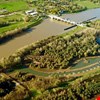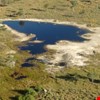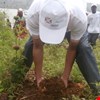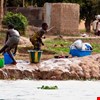GWP's activities influence water governance, leading to impact in terms of enhanced quality of life for populations and increased water-related investment.
GWP's activities influence water governance, leading to impact in terms of enhanced quality of life for populations and increased water-related investment.

By building on scientific evidence, learning from previous basin experience, and developing tools to support participatory climate-sensitive management, GWP Central and Eastern Europe (CEE), GWP Hungary, and the Government of Hungary laid the foundation for a more inclusive stewardship of cleaner and productive shared waters in the Tisza River Basin, a critical European watershed.

Formation of Area Water Partnerships (AWS) across the country has led to new leadership capacity at community level, promoting dialogue and local action. Since their inception, AWS have contributed to improving water security for about 13,400 people in Pakistan.

In Botswana, at the request of the Department of Water Affairs, GWP led the technical preparation of the country’s Plan for Integrated Water Resources Management (IWRM). This included the facilitation of stakeholder consultations and the coordination of demonstration projects on efficient water management solutions.

GWP Armenia teamed up with the local government in Parakar, and an engineering consultancy, to implement an affordable solution to prevent the discharge of untreated sewage into the environment. The solution enabled the reuse of treated wastewater which increased the water supply for irrigation, thereby improving agricultural productivity and food security.

In an ambitious effort to improve climate resilience at community level, GWP teamed up with a broad range of stakeholders to implement a pilot project in a transboundary catchment area. The project showcased the range of activities needed to bring about change: awareness-raising, stakeholder engagement, institutional capacity-building, and integration with government priorities.

GWP Zambia was requested by the government to facilitate the development a national Integrated Water Resources Management/Water Efficiency (IWRM/WE) plan. GWP Zambia managed the multi-stakeholder consultations, led an awareness raising campaign, and initiated a capacity building programme – all of which resulted in buy-in from a range of actors.

GWP supported the development and implementation of a National Integrated Water Resources Management (IWRM) Roadmap in The Gambia to guide the country towards increased water security. Validated in 2009, the implementation of the Roadmap has received approximately €2 million in funding from the African Development Bank and has led to the establishment of a Country Water Partnership.

GWP led the technical preparation of Mali’s Integrated Water Resources Management Plan and acted as an “honest broker” to lead national and local dialogue. The dialogue involved parliamentarians and representatives from the private sector who helped to identify water security priorities.

In the early 2000s it was clear to the citizens and municipality of the megacity of Karachi, Pakistan, that nothing short of stakeholder empowerment would be sufficient to overcome the urban water management problems facing the city. The result was the GWP-supported Karachi Water Partnership, which has successfully served as a platform for collective action by citizens, government, and the private sector to better manage water resources.